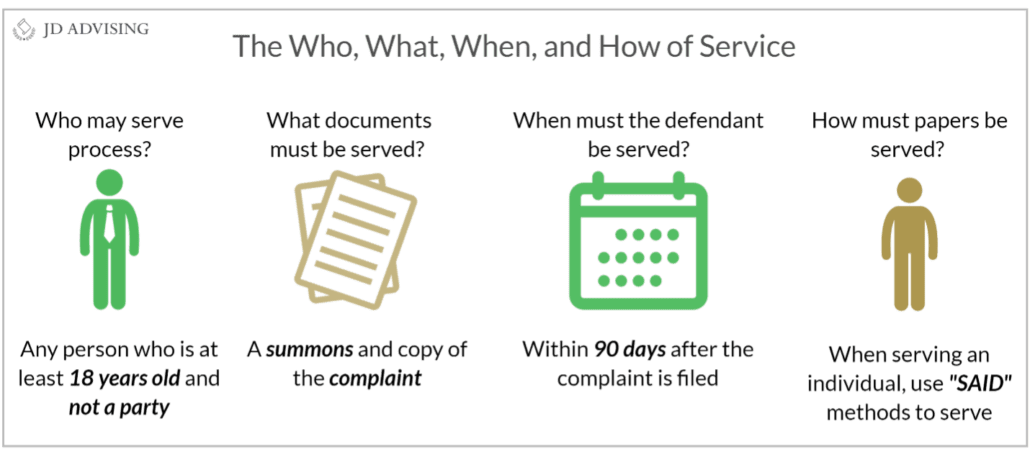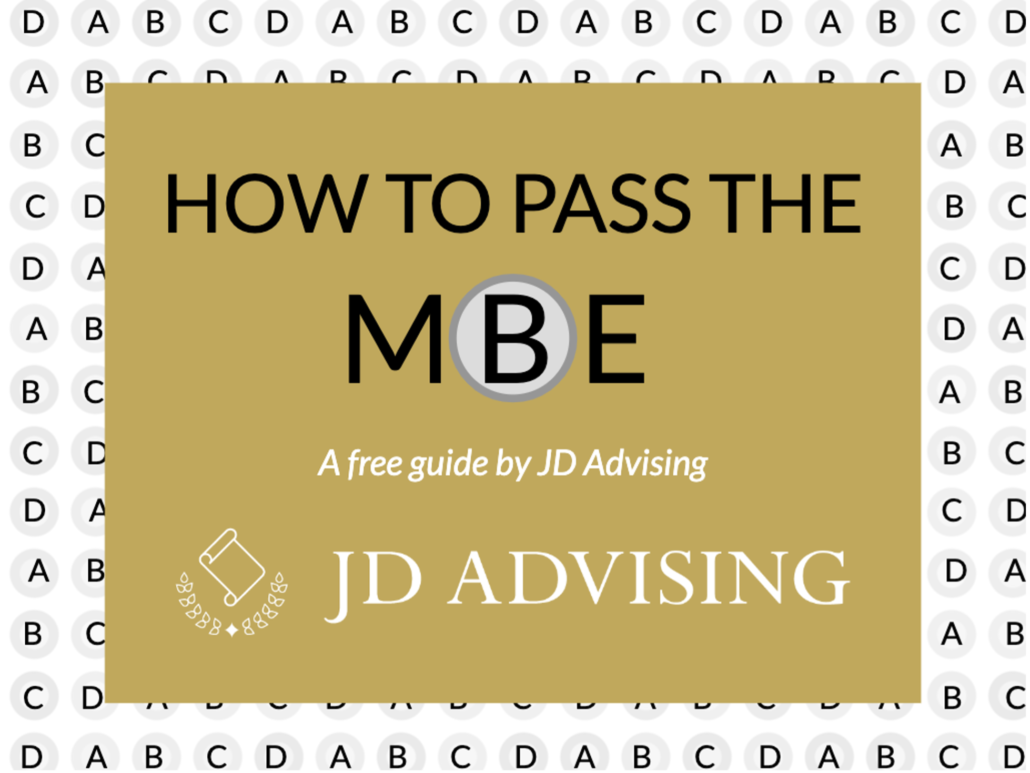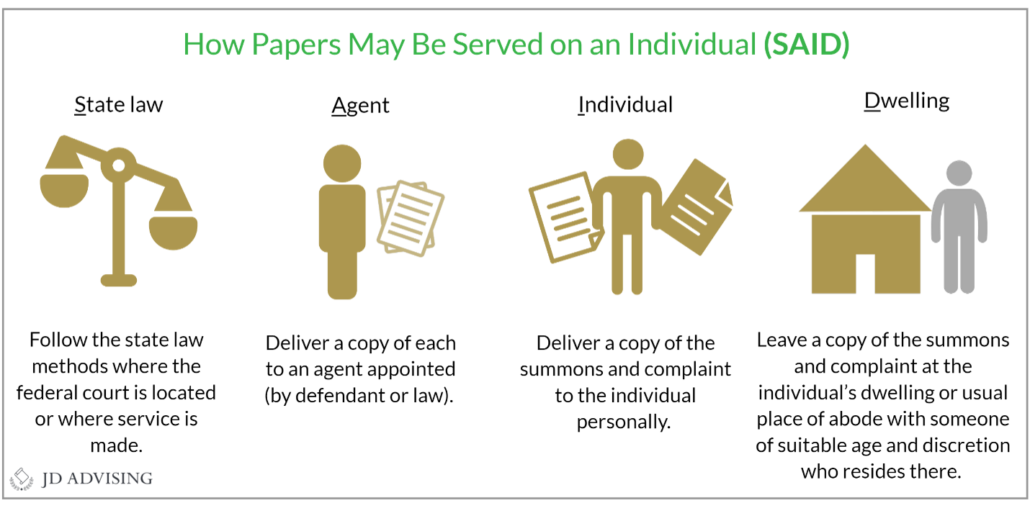Topic 7: Try It out!
Topic 7: Try It out!
Do not take our word for it—try out this method of learning the law then answering a question here.
First, Learn the Law!
Note: this is an excerpt from our JD Advising Civil Procedure outline. We chose the topic of service of process because the topic is relatively easy to understand but needs to be memorized because, like all MBE law, it tends to be tested in a nuanced fashion!
Do your best to memorize this law on service of process using an active method of review. (So do not just read the outline, but instead, try something like covering up the questions that are in the outline and seeing if you can answer them. Keep doing this until you get all the questions right!)
Service of process in federal court—the who, what, when, and how of service
- Who: Who must serve the defendant?
- Any person who is 18 years old and not a party.
- After serving the defendant, the process server must make a proof of service by filing an affidavit with the court that sets forth the manner in which the service was made.
- What: What documents must be served?
- A summons and a copy of the complaint.
- What the summons must contain: the name of the court and the parties, it must be directed to the defendant, the name and address of the plaintiff’s attorney or (if unrepresented) the plaintiff, the time within which the defendant must appear and defend and notify the defendant that a failure to appear and defend will result in a default judgment for the relief demanded, a signature by the clerk, and the court’s seal.
- Note: the court may permit an amendment.

- When: When must the defendant be served?
- A defendant must be served within 90 days after the complaint is filed.
- If the defendant is not timely served, the court will dismiss the action without prejudice (meaning the lawsuit can be refiled) or extend the time if there is good cause for the plaintiff’s failure.
- How: How must the papers be served?
- Serving an individual (other than a minor or incompetent)—options: (mnemonic = SAID)
- State law: follow the state law methods where the federal court is located or where service is made.
- Agent: deliver a copy of each to an agent appointed (by defendant or law).
- Individual: deliver a copy of the summons and complaint to the individual personally.
- Dwelling: leave a copy of the summons and complaint at the individual’s dwelling or usual place of abode with someone of suitable age and discretion who resides there.
- Ex.: Delivering a summons and complaint to the defendant’s parents’ house, if the defendant no longer lives there, is insufficient service of process.
- Serving an individual (other than a minor or incompetent)—options: (mnemonic = SAID)
Next, Answer a Question on the Law You Reviewed!
After you have memorized the law, go through an MBE question on this topic using the approach we discuss in topic 6.
Step one: read the fact pattern, then read the call of the question, then STOP.
Try reading the fact pattern first and then the call of the question. (If you prefer starting with the call of the question, that is fine too!) Then stop, rather than reading the answer choices. Cover up the answer choices if you need to! (Note: you can watch a YouTube video where this question is illustrated and discussed here!)
MBE question:
A woman from State A was in a car accident with a business owner from State B. The woman sued the business owner for negligence in federal court. Forty-five days after filing the complaint, the woman personally served the business owner with a copy of the summons and the complaint at his office. The state rules on service of process are identical to the federal rules.
Was the business owner properly served?
(A) Yes, because the business owner received actual notice of the lawsuit.
(B) Yes, because delivering a copy of the summons and complaint to the individual personally is permitted under the federal rules.
(C) No, because the woman did not serve the business owner within 30 days of filing the complaint.
(D) No, because the woman is a party to the lawsuit.
Step two: identify the subject.
Civil Procedure
Step three: identify the legal issue being tested.
Here, the issue is: Is service of process proper in this case?
Step four: state the rule.
Legal rule: Under the federal rules, service may be completed in four ways (mnemonic = SAID):
- State Law—follow the state law methods where the federal court is located or where service is made;
- Agent—deliver a copy of each to an agent appointed (by defendant or law);
- Individual—deliver a copy of the summons and complaint to the individual personally;
- Dwelling—leave a copy of the summons and complaint at the individual’s dwelling or usual place of abode with someone of suitable age and discretion who resides there.
While individual service is permitted under the federal rules, a party to the lawsuit may not serve the defendant. Under Fed. R. Civ. P. 4(c)(2), any person who is at least 18 years old and not a party may serve a summons and complaint.
Step five: answer the question without looking at the answer choices.
Here, service was not proper because the woman is a party to the lawsuit.
Step six: find the correct answer choice.
(D) No, because the woman is a party to the lawsuit
This answer choice matches the answer we arrived at when we answered the question without looking at the answer choices.
Step seven: review the incorrect answer choices.
(A) is incorrect as it is irrelevant if the business owner received actual notice of the lawsuit. He could still object to the manner in which he was served.
(B) is inaccurate because while personal service is permitted, a party to the lawsuit may not conduct that service.
(C) is inaccurate because under Fed. R. Civ. P. 4(m), the woman has 90 days after filing the complaint to serve the defendant.
If you got this question wrong, write down on a legal pad what you did not know. Did you forget the 90-day rule? Or maybe you forget one of the SAID methods of serving an individual? Writing these things down and then reviewing them before you approach Civil Procedure questions again is a great way to boost your MBE score!
Go to the next topic, Topic 8: Released MBE Questions—The Pros, the Cons, and Where to Get Them
Seeking MBE Assistance?
Seeking MBE Assistance?
- 📘 MBE Guide: Equip yourself with our FREE expert-crafted bar exam and MBE guides.
- Free Bar Exam Resource Center: Discover top resources, articles, and free webinars led by renowned bar exam professionals.
Top Resources as Vouched by our Students:
- MBE One-Sheets: One of our most highly acclaimed bar exam supplements!
- Bar Exam Outlines: Our comprehensive and condensed bar exam outlines present key information in an organized, easy-to-digest layout.
- MBE Private Tutoring: Opt for personalized, effective strategies.
- On Demand Bar Exam Course: Comprehensive bar exam preparation.
- Bar Exam Crash Course and Mini Outlines: Acclaimed and effective for a quick refresher.
- MBE Mastery Class, Real MBE Questions, and MBE Guide: Elevate your MBE preparation with these high-quality MBE supplements!
🔥 NEW! Check out our Repeat Taker Bar Exam Course and get introduced to our unmatched platinum Guarantee Pass Program.







Leave a Reply
Want to join the discussion?Feel free to contribute!